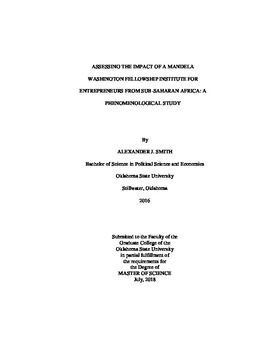| dc.contributor.advisor | Edwards, Michael Craig | |
| dc.contributor.author | Smith, Alexander James | |
| dc.date.accessioned | 2019-03-25T20:05:22Z | |
| dc.date.available | 2019-03-25T20:05:22Z | |
| dc.date.issued | 2018-07-01 | |
| dc.identifier.uri | https://hdl.handle.net/11244/317693 | |
| dc.description.abstract | Sub-Saharan Africa (SSA) is the youngest, poorest, and fastest growing continent in the world. As scholars study why the development of Africa has been slow compared to the rest of the world, a lack of investment in human capital development emerges as a prevalent reason. Regarding agriculture, in particular, resources supporting technological innovations that do not fit SSA's needs could be invested to develop its human capital. | |
| dc.description.abstract | Oklahoma State University was awarded a grant resulting in a six-week long entrepreneurship education program (EEP) that trained 25 entrepreneurs from 17 SSA countries, many of whom had an agricultural business context. Approaches to entrepreneurship education is a well-debated topic in the entrepreneurship literature, and how to best evaluate these education programs also has been contested. Due to the lack of consensus on how to capture the true impact of an EEP, the researcher used qualitative methods to conduct a phenomenological study (Moustakas, 1994). Twelve of the Institute's participants were interviewed via online technologies about nine months after the program's end. After the interviews, each transcript was analyzed through the procedure of Epoche, phenomenological reduction, and imaginative variation, from which specific participants' quotes were highlighted. As a result, four themes and seven sub-themes as well as an essence of the phenomenon emerged. | |
| dc.description.abstract | The emergent themes were improvements, changes, and challenges to their business models (three sub-themes); self improvement and empowerment (two sub-themes); social change (two sub-themes); and lessons learned from fellow Africans. These themes and sub-themes coalesced to form the phenomenon's essence: Building the capacity of socially responsible entrepreneurs for a new Africa. | |
| dc.description.abstract | Future research should assess the impact of formal business knowledge, e.g., concepts and theories, has on the decision making and long-term success of participants who may have gained such during an EEP. Additional research should also seek to identify which implicit or observational learning experiences create significant impressions that motivate training participants to become change makers, including their practicing of social entrepreneurship. It is also recommended that providers of EEPs continue to stress rigor and an ethos of accomplishment as well as provide opportunities for service-learning through their programs. | |
| dc.format | application/pdf | |
| dc.language | en_US | |
| dc.rights | Copyright is held by the author who has granted the Oklahoma State University Library the non-exclusive right to share this material in its institutional repository. Contact Digital Library Services at lib-dls@okstate.edu or 405-744-9161 for the permission policy on the use, reproduction or distribution of this material. | |
| dc.title | Assessing the Impact of a Mandela Washington Fellowship Institute for Entrepreneurs from Sub-Saharan Africa: A Phenomenological Study | |
| dc.contributor.committeeMember | Watters, Craig E. | |
| dc.contributor.committeeMember | Rutherford, Matthew W. | |
| dc.contributor.committeeMember | Rastegari-Henneberry, Shida | |
| osu.filename | Smith_okstate_0664M_15936.pdf | |
| osu.accesstype | Open Access | |
| dc.description.department | International Agriculture | |
| dc.type.genre | Thesis | |
| dc.type.material | text | |
